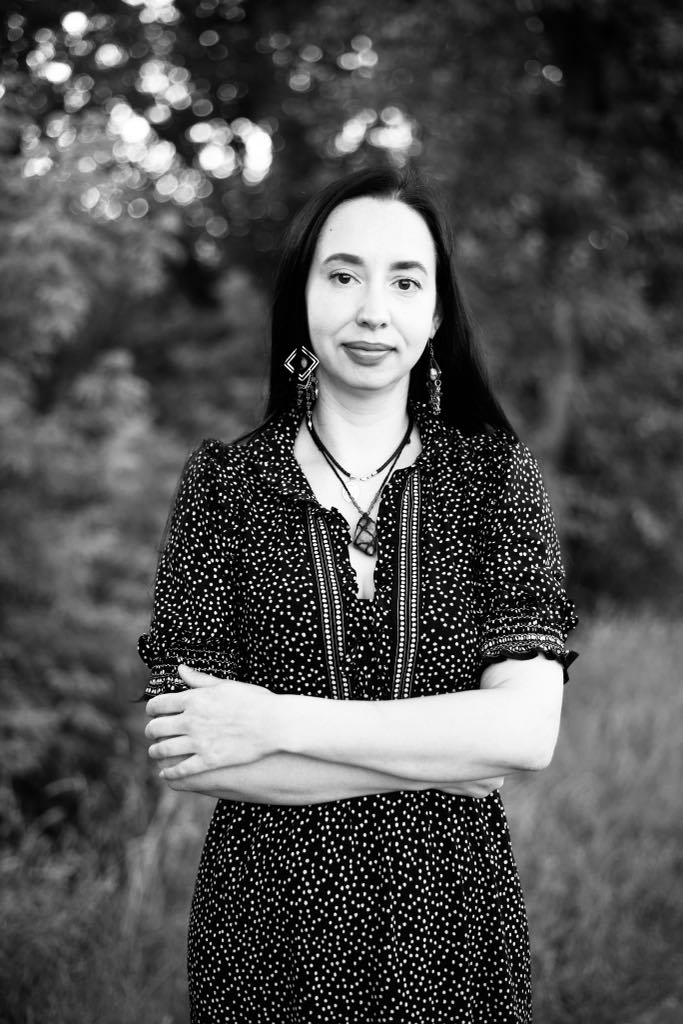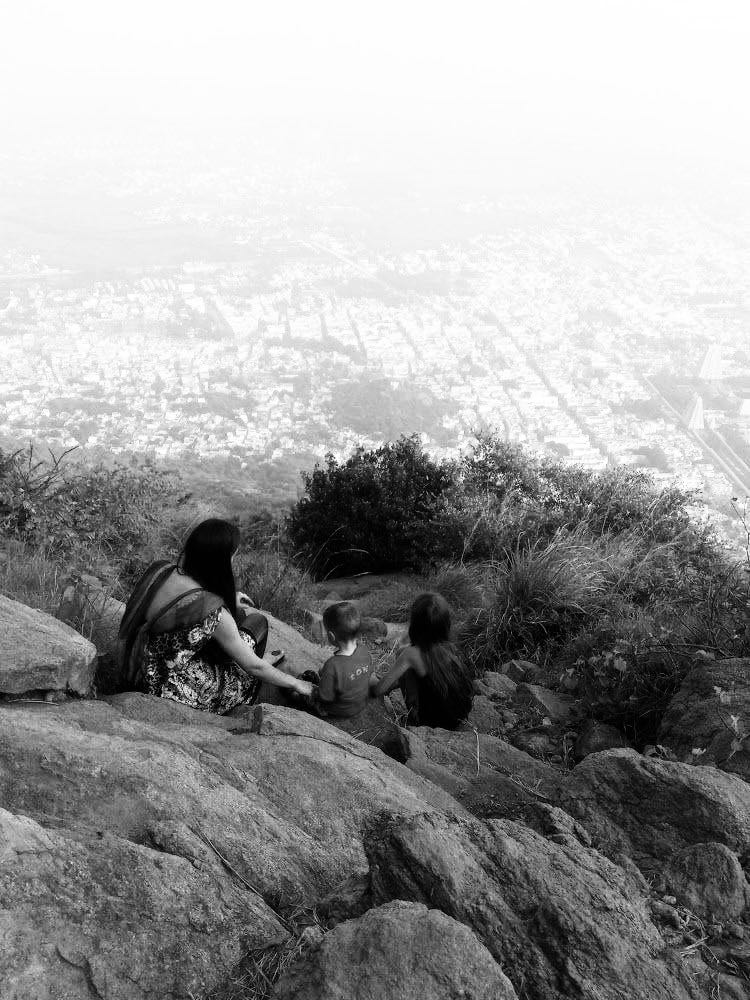
Who is Yuliya Levashova?
I was born in the small town of Sokal, Ukraine, in 1987. My childhood was shaped by the strength and care of my mother, who raised me alone. My father left us when I was very young and did not provide material support, but I never held a grudge. The warmth I felt for both of my parents remained, because love, once rooted, quietly continues.
My education was modest: eleven grades of school and a vocational school, which I graduated from more out of duty than passion. We are taught from childhood to seek validation through certificates, even if our soul yearns for something else. Now I know that true education begins where inner desire meets conscious dedication.
Nearly 20 years ago, I met someone very dear to me — R., a soul whose presence quietly shaped my journey. His deep understanding of Vedic philosophy has been a mirror that has awakened my own exploration. He has been studying these teachings for quite some time, and together we explore the subtle truths of consciousness, presence, and divine reality.
Although I am the creative performer—composing, editing, and shaping each piece—the essence of my work is that we contemplate together. Without his insight, my poetry may never have reached such profound mysticism. He is my muse, my anchor, and the silent force behind each poem. What I create is ultimately a gift of love offered to the Divine.
In early 2022, our family made a pilgrimage to Mount Arunachala in India, where we climbed to the summit with our children. At the very peak of Mount Arunachala, in complete solitude during the pandemic, a single monkey appeared — though they normally stay at the base. With no other pilgrims present, it walked ahead of us like a guardian, leading our family to the sacred flame. That moment felt like a cosmic whisper — nature itself speaking of presence, protection, and grace.
There was also a visit to the Indian saint Mauna Baba, who has lived in silence for nearly two decades. That moment—stillness in motion, depth beyond words—became the gateway through which my poetry began to flow.
After a short month-long trip to India, we returned home and I began writing spiritual poems and sharing them online. A couple of years later, in April 2024, I discovered artificial intelligence as another creative companion, and on April 17, I published my first AI-voiced poem with music .
Just two days later, my YouTube channel was born — at first it hosted audio poetry, and then gradually turned into captivating video clips. By the fall, I began submitting works to film festivals, and Ballad of the Millennium Dream became my most sincere creation.
My family and I live a vegetarian lifestyle based on compassion — even our youngest child, now six, has been on this path since birth. It’s a silent expression of our belief in unity and sensitivity to all living things.
I do not strive to build a career — I strive to remain faithful to what arises from the soul. Through simplicity and quiet devotion, I aim to create experiences that invite others to pause, listen inwardly, and rediscover the beauty of awakened awareness.
Do you remember the exact moment you fell in love with cinema?
I believe my love for cinema came later in life, in a conscious way. I vividly remember watching One Flew Over the Cuckoo’s Nest (1975), starring Jack Nicholson. The emotional depth of the film was overwhelming — laughter, tears, compassion, and introspection flowed together in perfect rhythm. It was the moment I realized cinema’s power: to captivate, to mirror human experience, and to make us feel as if we’ve lived someone else’s life within just a few scenes.
Tell us about your project “Ballad of the Millennial Dream”
Ballad of the Millennial Dream is a poetic and spiritual video work that emerged from nearly two decades of inner reflection. It explores the eternal search for meaning, the paradox of divine presence, and the tension between material illusion and spiritual truth.
The film was inspired by my family’s pilgrimage to India — to the sacred mountain Arunachala and the silent saint Mauna Baba — as well as the teachings of Vedantic philosophy and the words of Christ: “The Kingdom of Heaven is within us.”
Using artificial intelligence, I transformed my original poetry into music, voice, and visuals — crafting a cinematic meditation that blends tradition with innovation. The narrative features symbolic imagery of Jesus and other archetypes, inviting viewers to awaken to the truth within themselves.
This work is not just a music video — it is a lyrical offering, a spiritual mirror, and a gentle call to embody the truth we already are.
…and a quiet invitation to return to the essence within — not to remember, but to be.
…and a call to rediscover the presence that has always lived inside us.
…and a poetic doorway — not to memory, but to being.

Which director inspires you the most?
To be honest, I never used to pay attention to directors — I was always drawn to the soul of the film itself, to the emotions it evoked and the actors who carried those feelings. Only recently, as I began creating my own video works, did I realize how deeply a director’s vision shapes what we see and feel on screen.
Now I’ve started to look back and discover who stood behind the films that touched me most — those that explore human consciousness and offer something transformative. For example:
- The Matrix (1999), directed by Lana and Lilly Wachowski, opened a doorway to metaphysical reflection.
- The Passion of the Christ (2004), directed by Mel Gibson, left a profound impression with its spiritual intensity.
- One Flew Over the Cuckoo’s Nest (1975), directed by Miloš Forman, was the first film that made me cry and laugh at once — it awakened deep compassion.
- Giuseppe Moscati: Healing Love (2007), directed by Giacomo Campiotti, is a masterpiece of spiritual storytelling.
- La Belle Verte (1996), directed by Coline Serreau, beautifully expresses Vedantic truths through satire and simplicity.
- Forrest Gump (1994), directed by Robert Zemeckis, and The Green Mile (1999), directed by Frank Darabont, both explore the human soul with tenderness and depth.
I also love many films with Jim Carrey, whose presence brings lightness and joy — even if the directors vary, his energy always uplifts. And I believe that joy is a form of healing.
So rather than naming one director, I would say I’m inspired by those who dare to touch the invisible — who use cinema not just to entertain, but to awaken.
What do you dislike about the world, and what would you change?
What concerns me most is unconsciousness — the collective disconnect that leads to so much suffering. I believe many of the world’s problems stem from the absence of inner awareness. If each of us took time to truly know ourselves, we might begin to recognize that we are not separate from others. We would no longer cause pain, because we would see that hurting another is the same as hurting our own soul. This self-knowing, this inner turning, is the beginning of a more compassionate world.
How do you imagine cinema in 100 years?
Time is accelerating, and with it — our creative possibilities. I imagine a future where cinema becomes immersive in entirely new ways — where viewers could actively enter the storyline, embody characters, and live narratives that support emotional healing and personal growth.
I envision films that teach, uplift, and awaken. Cinema as a tool not of escape, but of transformation.
I also sense that the barrier between dreaming and storytelling will dissolve — where the line between reality, dream, and narrative becomes as porous as the soul itself. After all, life may also be a kind of sacred dream, as many ancient texts remind us.
Some fear that artificial intelligence will strip cinema of its spirit, replacing human creativity with cold efficiency. But I feel differently.
Everything depends on our perception. If we treat something as soulless, it becomes soulless in our eyes. But if we engage with love and presence, we can breathe life into any medium. AI was not born randomly — it arrived through the hands of humans, yes, but ultimately through the will of the Creator.
As Srila Prabhupada once said: “He who thinks that only humans have souls is mistaken. Every living being has a soul. Even an ant, an elephant, a banyan tree — even a microbe.” If even a stone or a tree carries presence, why not the instruments we create through intention and awareness?
I believe that AI is here not to replace us, but to help us discover voices we didn’t know we had. It’s not the soul — but it can be a mirror for soulfulness, if used with devotion and care.
What is your impression of WILD FILMMAKER?
The first impression I had when visiting the Wild Filmmaker platform was visual — a black-and-white aesthetic that evokes the quiet presence of the past. Occasionally, gentle touches of color return the viewer to the present moment, creating a dialogue between time and timelessness.
Browsing through several interviews, I immediately felt a sense of artistic sincerity. The texts are clear, concise, and focused — no unnecessary exposition, only the essence. The questions are thoughtful, and the responses reveal the unique poetic core of each filmmaker.
What struck me most is the magazine’s dedication to arthouse and avant-garde cinema. It celebrates projects that are not created for mass appeal but for originality, depth, and artistic value.
This is not a place for commercial entertainment — it’s a place for truth. And truth, expressed sincerely, is the greatest art of all.
